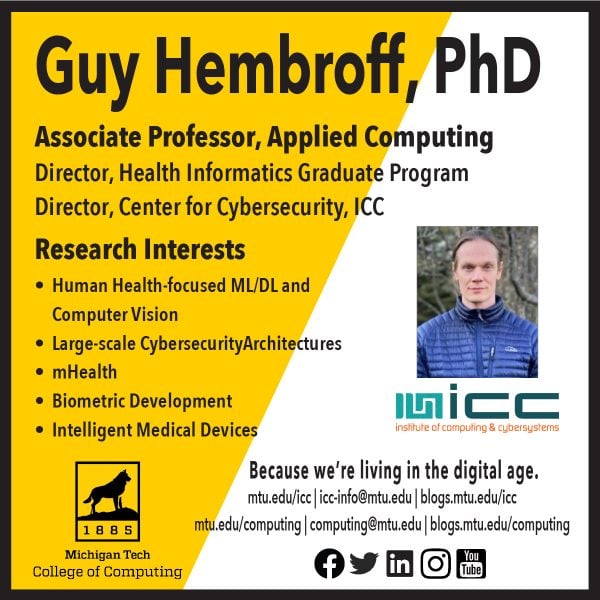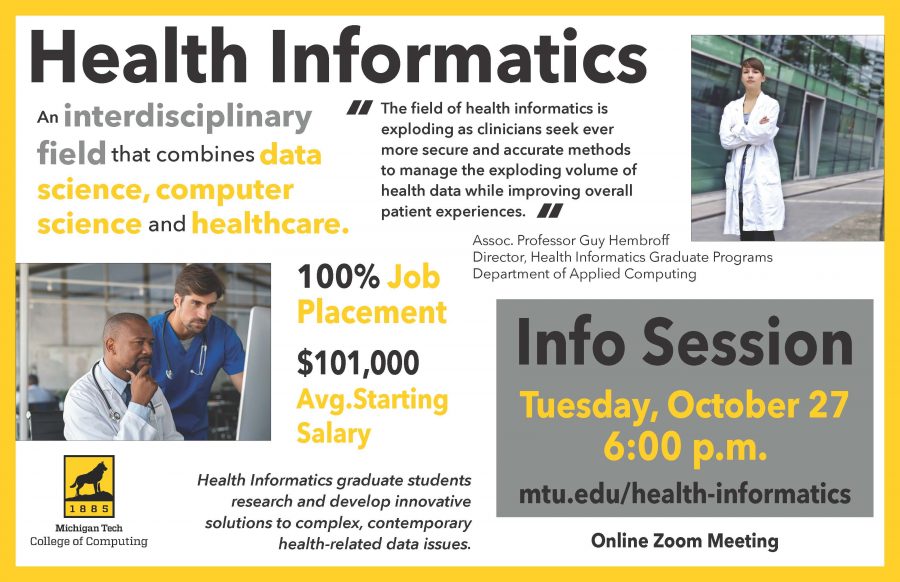Michigan Tech will receive $4.3 million to help the state of Michigan expand sequencing for COVID-19 and other infectious diseases.
The Michigan Department of Health and Human Services (MDHHS) announced that MTU is one of four Michigan universities receiving $18.5 million in federal funds over the next two years to collect and analyze genomic data to address emerging infectious disease threats and enhance the state’s ability to respond to those threats.
With Michigan State University, the University of Michigan, and Wayne State University, Tech will use the funding to increase sequencing capacity in the state — starting with SARS-CoV-2 and then expanding to other infectious disease threats with potential for broad community spread.
Michigan Tech’s research team includes co-principal investigators Caryn Heldt (ChE/HRI), Dukka KC (CS) and Hairong Wei (CFRES/ICC-BDH, DataS), and senior researchers Kristin Brzeski (CFRES), Guy Hembroff (AC-BDH, CyberS), Kelly Kamm (KIP), Stephen Techtmann (BioSci) and Kui Zhang (Math/ICC-BDH).
Read more at mtu.edu/news.

On May 18, 2021, Dr. Guy Hembroff, Applied Computing, presented an invited talk at a meeting of Michigan’s Health Information Management Systems Society (HIMSS). Dr. Hembroff discussed his work developing a trusted framework architecture designed to improve population health management and patient engagement.
The talk demonstrated his team’s work in the development of accurate geo-tagged pandemic prediction algorithms, which are used to help coordinate medical supply chains to care for patients most vulnerable to COVID-19, an innovation that can be extended to help improve general population health management.
The framework of the pandemic prediction architecture, which aggregates longitudinal patient health data, including patient generated health data and social determinants of health, is a holistic and secure mHealth community model. The model can help Michigan residents overcome significant barriers in healthcare, while providing healthcare agencies with improved and coordinated population management and pandemic prediction.
The architecture’s machine learning algorithms strategically connect residents to community resources, providing customized health education aimed to increase the health literacy, empowerment and self-management of patients. The security of the architecture includes development of unique health identifiers and touch-less biometrics capable of large-scale identity management.
Dr. Guy Hembroff is an associate professor in the Applied Computing department of the Michigan Tech College of Computing, and director of the Health Informatics graduate program. His areas of expertise are network engineering, medical/health informatics, biometric development, intelligent medical devices, data analytics, and cybersecurity.
The event was sponsored by HIMSS and Blue Cross Blue Shield of Michigan (BCBSM).
A mission-driven non-profit, the Healthcare Information and Management Systems Society, Inc. (HIMSS) is a global advisor and thought leader supporting the transformation of the health ecosystem through information and technology, according to the organization’s website.

Dr. Guy Hembroff presented a talk to representatives of a number of digital health startup companies May 20, 2021, as part of an event hosted by the the HealthSpark program of 20 Fathoms, an entrepreneurial-focused member organization in Traverse City, Michigan.
The startup companies, in many U.S. locations, are being mentored by 20 Fathoms members.
Dr. Hembroff is an Associate Professor of Applied Computing and director of the Health Informatics Master of Science degree program at Michigan Tech.
Dr. Hembroff’s talk, “Cybersecurity and Privacy + X: Best Practices for Health Startups,” was designed to help startup companies gain awareness of and plan strategically for the cybersecurity and privacy elements of their company, affiliations with vendors, and the rights and protections of consumers.
Talk topics included an overview of data security and privacy, web security, scams and fraud detection and protection, mobile device security, network security, incident response, digital health data integration and interoperability, and protection from ransomware attacks.
The HealthSpark program is Traverse City’s digital health accelerator. The organization advances innovation and facilitates solutions that will resolve today’s challenges in rural healthcare. A community-focused initiative, HealthSpark work sto bring world-class healthcare solutions to rural patients through the advancement of digital technology.

20Fathoms is a membership organization for entrepreneurs, intrapreneurs, tech professionals, creatives, and other innovators in the the Traverse City, Michigan, region.
Led by a team of experts who have walked-the-walk, we provide services, resources, support, and a robust network to help our members accelerate both their careers and businesses, according to the 20Fathoms website.
Are you thinking about attending graduate school? Are you open to learning about emerging career areas in which you can leverage your undergraduate learning in healthcare or computer science?

On Tuesday, October 27, 2020, at 6:00 p.m., via online Zoom meeting, the Health Informatics Master of Science and Accelerated Master’s programs will present a virtual info session for current students.
Please pre-register for the free info session here.
From the general to the specific, the info session will cover what you need to know about applying for and completing a Health Informatics master’s degree at Michigan Tech.
Attendees will consider the benefits of an advanced degree, learn about the fast-track accelerated master’s program, review the the online application process, and more.
Associate Professor Guy Hembroff, Health Informatics graduate program director, and Jacque Smith, director of Enrollment Services for the Michigan Tech Graduate School, will host the info session.
A link to the virtual info session will be shared shortly.


Associate Professor Guy Hembroff, director of Michigan Tech’s Health Informatics graduate program, presented an invited virtual talk to physicians, residents, and medical students at the Bahiana Medical School, Salvador, Brazil, on September 25, 2020.
Hembroff spoke about, “The Challenges and Opportunities of Artificial Intelligence in Disease Prevention and Monitoring.”
BAHIANA (Bahia School of Medicine and Public Health) is a private, nonprofit, educational, cultural, scientific and healthcare institution. Its main purpose is “teaching, research and the spread of knowledge and special services in the fields of health, science and culture in general.” Learn more here.